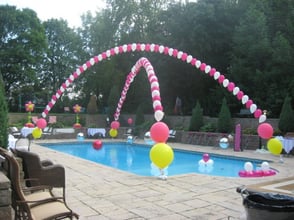 Checking your swimming pool and/or spa for possible leaks is the most important part of preparing your pool for warmer weather. Small cracks and leaks may have developed over the cooler months when you used the pool less frequently. A ladder or railing may have come loose in high winds.
Checking your swimming pool and/or spa for possible leaks is the most important part of preparing your pool for warmer weather. Small cracks and leaks may have developed over the cooler months when you used the pool less frequently. A ladder or railing may have come loose in high winds.
You may have used your Florida pool during the winter season and found that your water level was lower than expected. This can be an indication of a problem requiring pool leak repair.
Bucket test
The easiest way to check the water level is through the basic bucket test. Fill a five gallon bucket with water about two inches higher than the water level on the step. Set it on the step and leave it for 24 hours. Mark the water level inside the bucket and on the outside.
Measure the difference between the outside pool level and the water level inside the bucket. Evaporation should be about a quarter inch. If the water level in the pool is more than a quarter inch below the level marked on the outside of the bucket, it is time to look for a leak.
This test has to be conducted during a dry period when the pool is not used and the pump is working. It is only the indicator of a problem, not the solution.
Check the following sections of your pool if you suspect a leak:
These are a few of the areas where little leaks can occur. Little leaks can become large leaks if they are ignored. Leaks on the lower sides and bottom of the pool are under pressure from the water and they can grow quickly. A quarter-inch leak can result in a loss of 100 gallons or more of water over a 24-hour period, based on the size of the pool.
Many pools are lined with mosaic tiles in beautiful designs. These tiles are probably attached to a gunite or fiberglass surface. They should be inspected frequently since loose or broken tiles can indicate leaks in the pool shell.
Vinyl pool liners can deteriorate and cause leaks. Vinyl is used frequently with in-ground and above ground pools and it must be professionally repaired.
Fixing the problem
Pool leak repair is not a do-it-yourself job. A professional inspection and repair service will assist you in finding the leak and fixing it so that you can enjoy your pool year-round.
Aquaman Leak Detection, serving 10 counties in Florida, will use state-of-the-art technology to find and repair the leak. This includes diving in large pools to inspect the bottom drains and outlets. Pumps, hoses and other parts are also checked. Leaks can also be detected by sound using the latest equipment.
The concrete and paved areas around the pool are inspected without digging and tearing apart. Remember that water is the strongest force and that it can eat away at concrete, paving stones and grout without you being aware of the process. Your water bill will be higher while your pool's water level remains low.
Check out all of your pool area including your pool's pump, heater and circulating system. If you suspect a leak, contact Aquaman Leak Detection for quick, professional pool leak repair. You will enjoy your summer knowing that your pool is keeping you cool without leaks.

With over 20 years of reputable experience finding leaks, owner Lowell Ball created a unique and patented leak detection system that accurately finds leaks without damaging property. We are so confident in our system and our workmanship, we offer the strongest warranty in the industry.
Aquaman Leak Detection Corporate
1275 South Patrick Dr, Suite A6
Satellite Beach, FL 32937
Owner Direct: 321.431.4784
844.766.5532 (844 POOL LEAK)
info@aquamanleakdetection.com
Office Hours:
9AM-6PM Mon-Fri
Emergency Service Available 24/7
Blog Comments